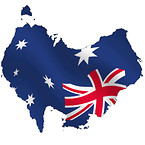
There could hardly be a more Southern Hemisphere expression than 'fair dinkum'.
The phrase, which is hardly used outside Australia, conjures up images of horny-handed farm hands with corks on their hats. A 'fair-dinkum Aussie' is indeed what the locals call someone who embodies the nation's values
This from wiktionary.org
Adjective
fair dinkum (not comparable)
(Australia, New Zealand, slang) Genuine, honest, fair and square.
Are you fair dinkum? — Are you telling me the truth? ; Do you really mean that?
According to Melvyn Bragg's The Adventure of English: The Biography of a Language, "dinkum" comes from the English Midlands and meant work. "Fair dinkum" referred to a fair day's work and subsequently fair play.
From M. Griffiths, Waterloo
The word "dinkum" was reputedly coined on the Australian goldfields. It comes from one of the Chinese dialects widely spoken at the diggings: "din" and "kum" loosely translating as "true gold".
From Catherine Le Breton, Leura
Fair Dinkum was a response of the early Chinese goldminers to the question: "Are you finding a fair amount of gold?" because "din-gum" means "good gold". So over time the expression has become a positive response to a good news story.

http://ozwords.org/?p=6840
Dinkum and its variant fair dinkum are among the central Australian terms. Australian English has had two other terms with much the same meaning as dinkum—‘fair; genuine; honest; true’—but they are no longer used. Jonick was one of them, and it appeared in Australia in the 1870s as a variant of jannock ‘fair, straightforward’, a word that has widespread use in English dialects. It became obsolete in Australia by the 1950s.
The second term, ryebuck, is probably a Yiddish word and a variant of German reibach ‘profit’. It became common in Australia in the 1890s as an expression of agreement or assent (much the same as ‘all right’) and as an adjective meaning ‘good, excellent’. As with jonick, it had largely disappeared by the 1950s, although it has been retained as the title of a popular Australian folk song ‘The Ryebuck Shearer’ (the expert or ‘gun’ shearer). Dinkum, however, has been such a strong word in Australian English, that synonyms have hardly been necessary. The word dinkum is first recorded in Australian English in 1890.
Where does dinkum come from? One of the earliest (and unlikeliest) explanations occurs in a letter to a newspaper in 1943, which takes the word back to the gold rushes of the middle of the nineteenth century:
The word ‘dinkum,’ meaning a genuine man—what the Americans call a ‘regular fellow’—came from the old Australian gold rush days. The miners used to gamble after the day’s work, and anyone who stayed ‘cold sober’ was looked upon as having an advantage—an unfair one—over the other players. So it became a point of honour that all should drink together—‘fair drinking’ was the slogan. Some of the foreigners pronounced the phrase ‘fair dinkum’. And so Australians adopted the pronunciation, at first jocularly, but as time went on a new generation inherited the word ‘dinkum’ without knowing anything of its origin.
In response, another correspondent offers a different account of the origin of the term during the gold rushes:
From Mr R.B.J. Clayton …
is wrong in his assertion that ‘fair dinkum’ is a corruption of ‘fair drinking’. It is a well-known pidjin English word, and means ‘a fair thing’. I have traced its literary use in Australia to the early ’80’s. Before that it was in oral currency in Canton and other parts of China, as well as Hong Kong. It is probably a century old, for, as students of philology know, no intrusive word comes into literary use until it has been well established in oral use. In Australia it was commonly used in transactions with Chinese goldminers and vegetable vendors and indentured kanakas.
This is the beginning of the story, which will emerge more strongly in the following decades, that dinkum is Chinese. Here are two recent manifestations of the story:
(2004) Fair dinkum is derived from the Victorian gold rush days when gold had to be sold to government assayers. The Chinese (Cantonese) would say their pickings were ‘ting kum’ meaning genuine gold.
(2005) It is more than possible that that most dinkum word ‘dinkum’ has its origin in the Chinese ‘ding kam’, meaning ‘real gold’.4
In the history of the origins of Australian words, this is one of the more enduring folk etymologies. It has the staying power of such ‘old chestnut’ folk etymologies as the claim that posh is derived from ‘port outward, starboard home’ or that wog comes from ‘western (or wily) oriental gentleman’. It is true that one of the meanings of the Mandarin word dǐng is ‘very; most; extremely’, and so in Mandarin ‘extremely gold’ would be dǐng jīn, and in Cantonese ding kam would mean ‘top gold’. We have no evidence, however, that these Chinese combinations were ever used by the Chinese, whether on the goldfields or out of them.

Chinese miners at the goldfields. Source: National Museum of Australia
Read more here...
http://www.phrases.org.uk/meanings/fair-dinkum.html
https://en.wiktionary.org/wiki/fair_dinkum
Click to Post

